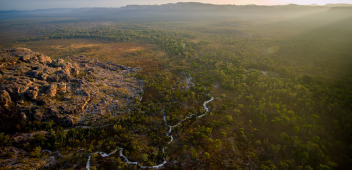COVIDpoll: Lowy Institute Polling on Australian Attitudes to the Coronavirus Pandemic
The Lowy Institute COVIDpoll finds that almost all Australians say Australia has handled COVID-19 well, but most are disappointed by China and the United States’ response.

- Nine in ten Australians (93%) say Australia has handled COVID-19 very or fairly well so far. By contrast, a third (31%) say China has handled the outbreak well, and only one in ten Australians (10%) say the United States has handled the outbreak well.
- A substantial majority of Australians (68%) now feel ‘less favourable towards China’s system of government’ when thinking about China’s handling of the outbreak. They hold mixed views about the impact of the crisis on China’s power: around a third (37%) say China will be ‘more powerful’ than it was before the crisis and; a quarter (27%) say it will be ‘less powerful’.
- Australians are divided on the trajectory of US power in the post-COVID world: 53% say the United States will be less powerful; 41% see its power remaining stable and 6% see US power growing.
- A majority assess the performance of our national authorities far more favourably than that of the World Health Organization (WHO). Confidence that chief medical officers, state and territory governments and the federal government are doing a good job is extremely high (92%, 86% and 82% respectively). Fewer (59%) express confidence in the WHO.
- A majority of Australians (53%) want ‘more global cooperation rather than every country putting their own interests first’ during global crises. Seven in ten (70%) say globalisation is ‘mostly good for Australia’.
- Most Australians (73%) say they would prefer Joe Biden to become the President of the United States at the US election in November.
- Once the pandemic is contained, the majority of Australians (59%) remain as willing to travel as prior to the outbreak. Three in ten (35%) say they will be less likely to travel.
- Australians have preferred to look to the prime minister (59%), government websites (50%) and the ABC (50%) as their sources of information during the pandemic.
Australian views on responses to COVID-19
As the COVID-19 pandemic continues around the world, Australians are extremely confident in Australia’s response but unimpressed by the performance of many global powers and, in particular, that of the United States. While nine out of ten Australians (93%) say Australia has handled the outbreak very or fairly well so far, only 10% say the same thing about the United States. Even China has outperformed America, according to Australians, with 31% saying China has handled the outbreak very or fairly well. Among other countries polled, most Australians (79%) also say Singapore has handled COVID-19 very or fairly well. The virus has taken a heavy toll in the United Kingdom and Italy, and less than a third of Australians say that the United Kingdom (30%) has handled the outbreak well, while only 15% say Italy has handled it well. The United States sits at the bottom of the list of countries, with only 10% of Australians saying it has handled the outbreak very or fairly well so far.
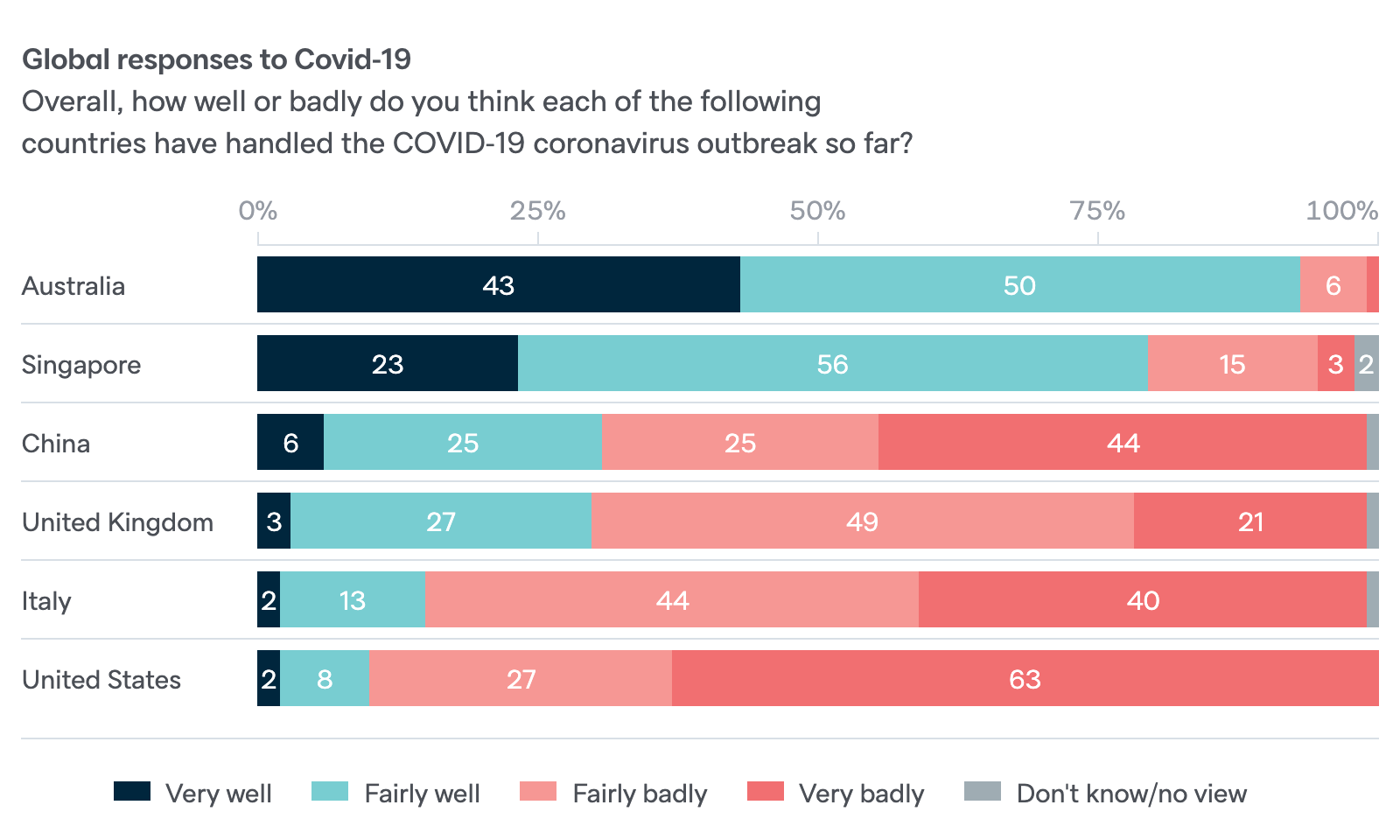
This negative assessment of the United States’ management of the crisis coincides with mixed views of the United States’ power in the world. In 2020, the majority of Australians (53%) say that the United States will be less powerful than it was before the crisis. This is 20 points higher than the response in the Lowy Institute Poll 2009 after the global financial crisis, when 33% of Australians said the United States would be less powerful than it was before the crisis.[1] Four in ten Australians (41%) say the United States will be just as powerful as before the crisis, while 6% say the United States will be more powerful.
When considering the US presidential election in November, seven in ten Australians (73%) say they prefer Joe Biden as the next US President, equal to Australian support for Barack Obama’s candidacy in 2008.[2] Although the United States’ handling of the COVID-19 crisis is seen very negatively, support for Donald Trump’s presidency has increased from a low base, with 23% favouring his bid for re-election in 2020, a 12-point jump from Australians’ views prior to the 2016 US election.[3]
The COVID-19 crisis has tempered Australians’ expectations of China's power in the future. While more than a third of respondents (37%) say China will be more powerful than it was before the crisis, this is much lower than the 72% who said in 2009 that China would be more powerful after the global financial crisis.[4] A third (36%) also now say China will be just as powerful, with 27% saying China will be less powerful than it was before the crisis.
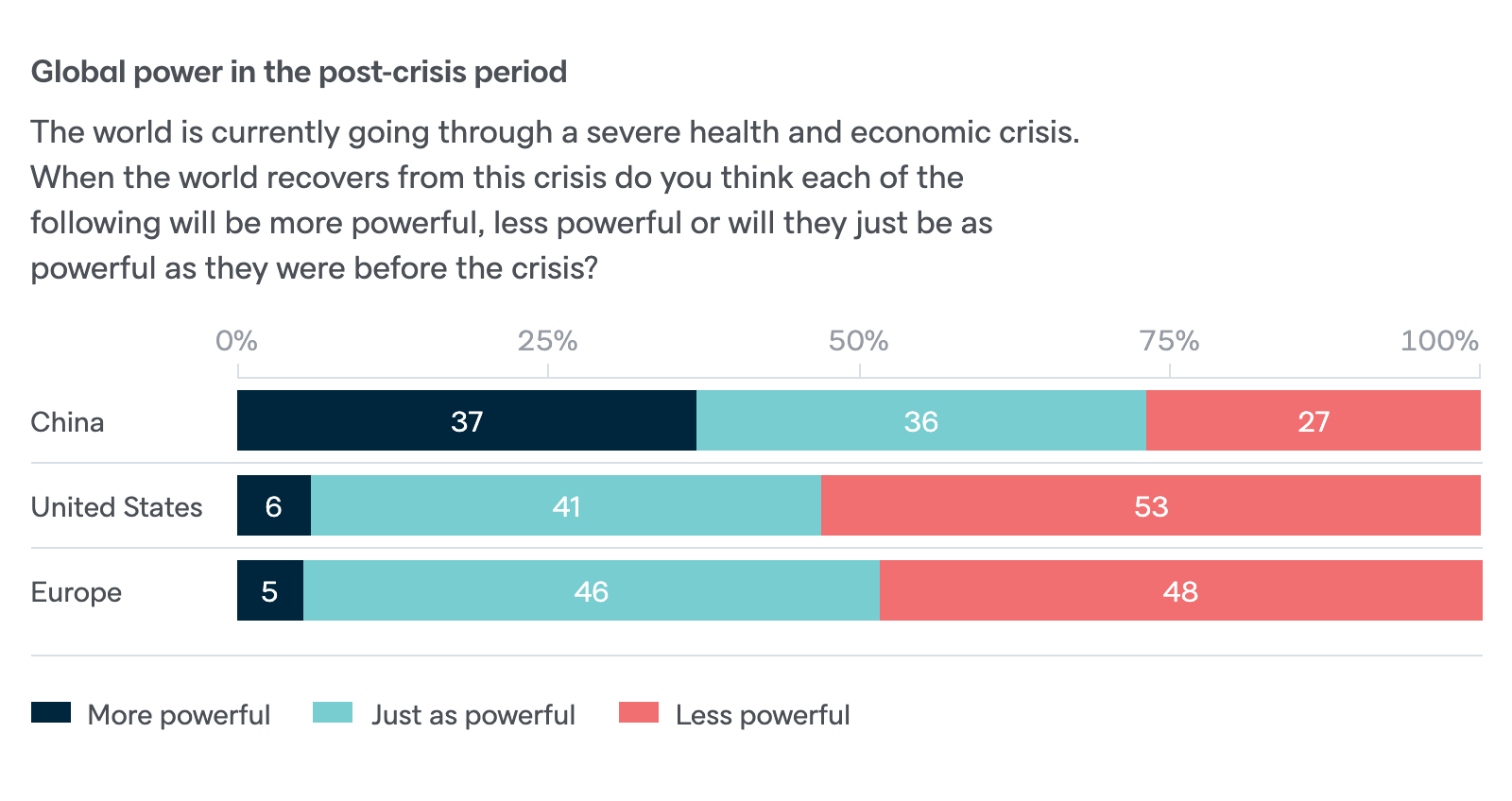
China’s response to COVID-19 and its system of government as an authoritarian one-party state has been subject to heightened scrutiny in Australia. Most Australians (68%) are less favourable towards China’s system of government when thinking about the COVID-19 outbreak. A quarter (27%) say they feel about the same about China’s system of government, while 5% say they are more favourable.
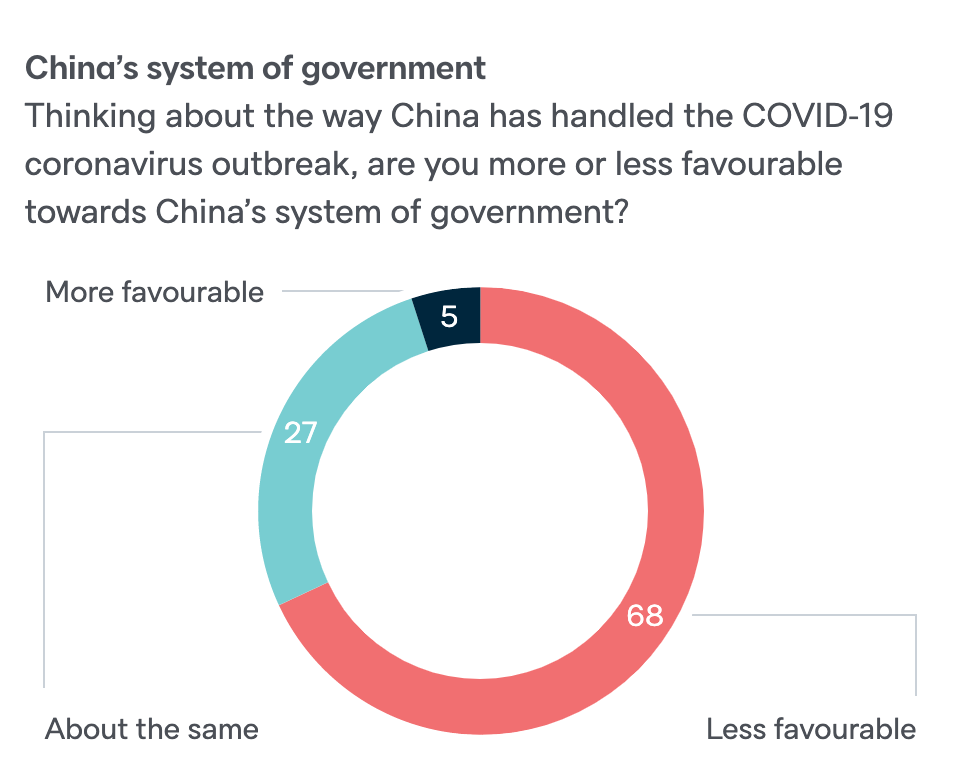
With parts of Europe hit hard by the virus, Australians are uncertain about its future. Around half (48%) say Europe’s power will be reduced after the COVID-19 crisis, almost the same number (46%) say it will be just as powerful as before the crisis, and 5% say Europe will be more powerful.
Australians and globalisation
Australians have tended to avoid recent trends of protectionist and anti-globalisation sentiment, and despite the ongoing pandemic which has affected every part of the world, their embrace of globalisation endures. Seven in ten (70%) Australians say that globalisation is ‘mostly good for Australia’, more than the number expressing the same view in the Lowy Institute Poll 2006 and consistent with their responses in 2019.[5] There is a gap, but only slight, between urban and rural populations, with urban Australians slightly more supportive of globalisation (72% saying it is mostly good) than their regional counterparts (65% saying mostly good).
At a time where many countries are focused on their own domestic situations, Australians are calling for more global cooperation in response to international crises. More than half the country (53%) say: ‘We need more global cooperation, rather than every country putting their own interests first.’ Only 31% say: ‘The balance between global cooperation and the interests of individual countries is about right.’ And 16% say: ‘We need less global cooperation. Every country should put their own interests first.’
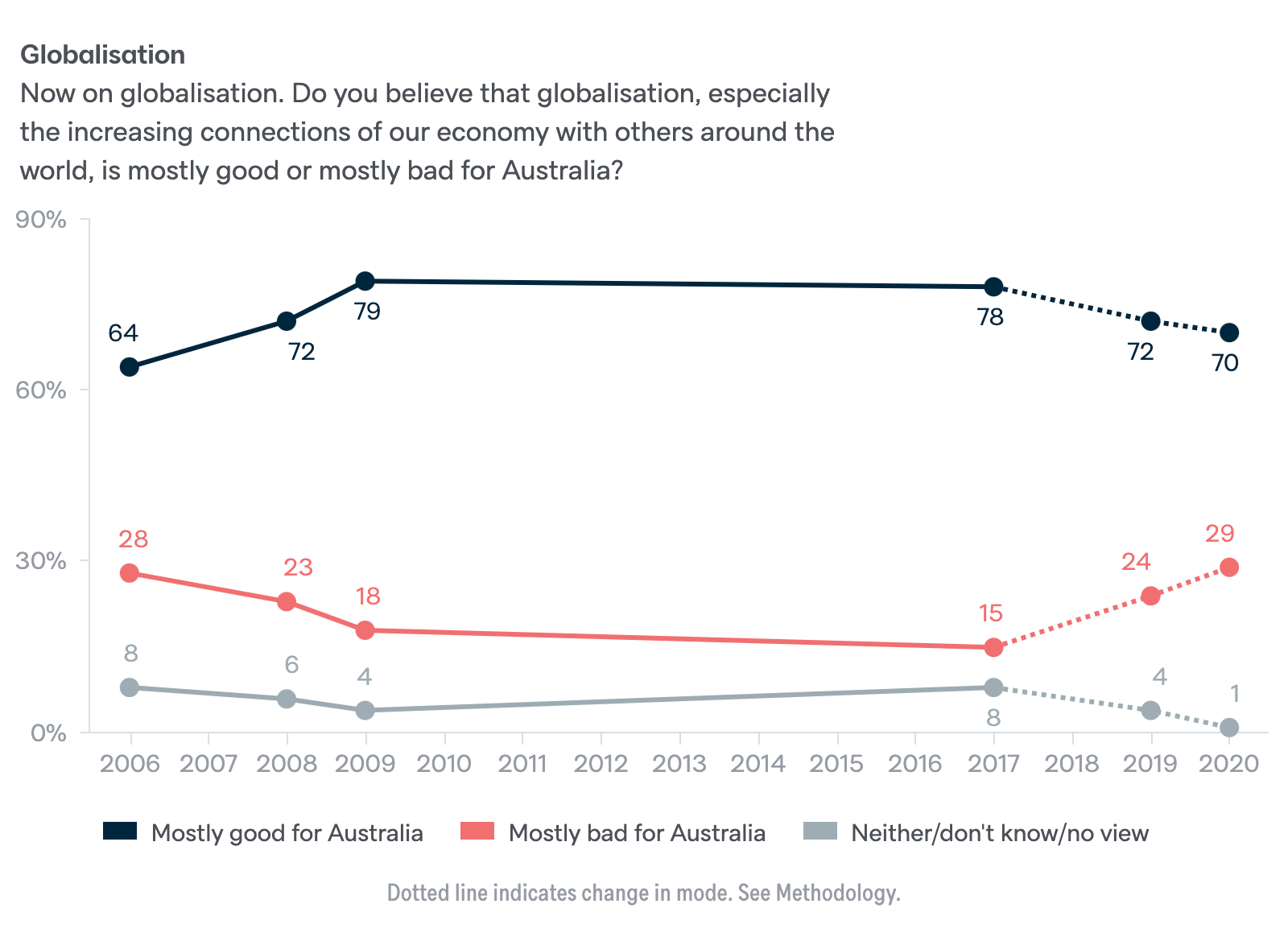
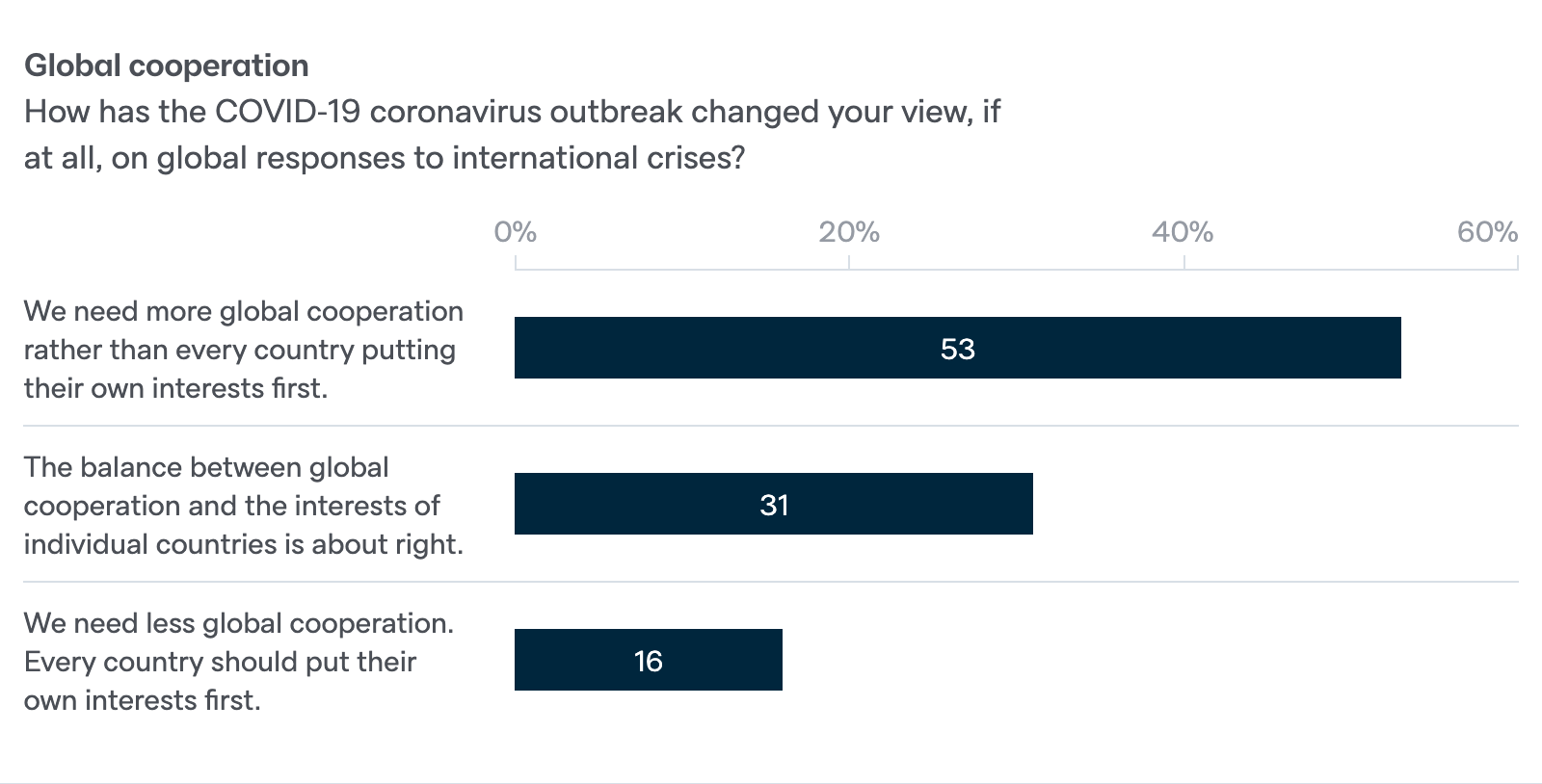
Australians have always been travellers: they take more than 11 million trips overseas every year and an estimated one million Australians live and work overseas at any given time.[6] They appear undeterred by the pandemic, with the majority of Australians (59%) saying that they are just as likely to travel as before, once the pandemic is contained. Only 6% say that are more likely to travel once the pandemic is contained, and 35% say they are less likely to travel than before the outbreak.
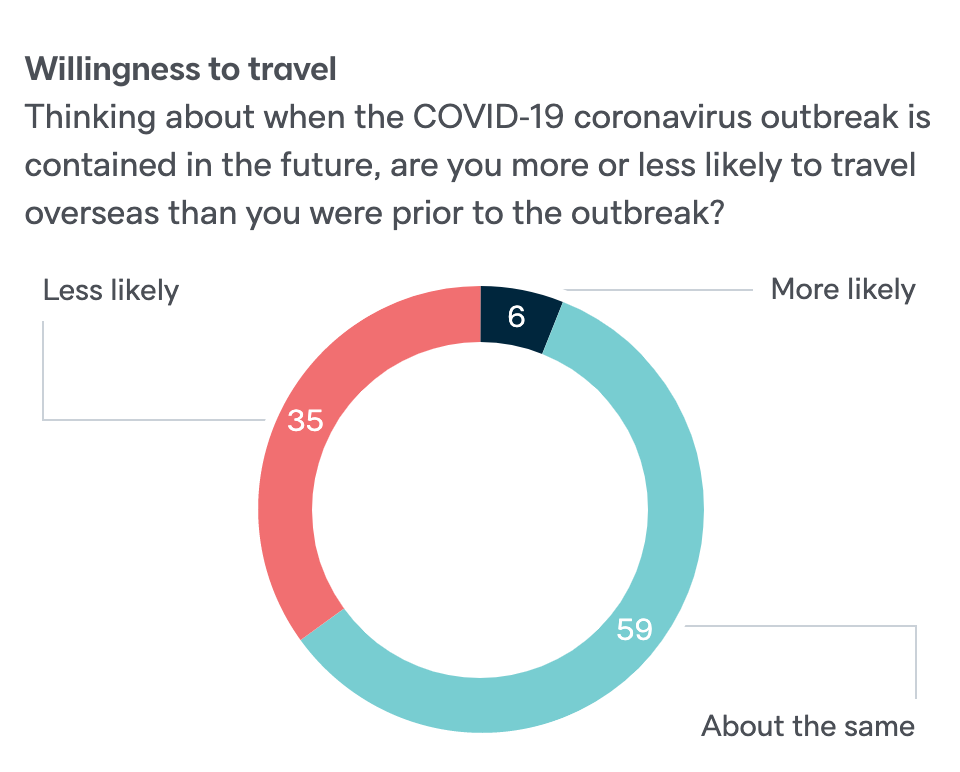
Australian perceptions of authority and sources of information
Although Australians are supportive of more global cooperation, more have expressed confidence in Australian authorities than in the WHO. Almost all Australians express confidence in the performance of chief medical officers (92% are very or somewhat confident they are ‘doing a good job’), state/territory governments (86% very or somewhat confident) and the federal government (82% very or somewhat confident) in responding to the coronavirus outbreak. A smaller majority (59%) express confidence that the WHO is ‘doing a good job responding to the coronavirus outbreak’.
Aligning with the confidence they express in their governments’ crisis response, a majority of Australians (59%) say the prime minister and government ministers are a preferred source of information. The ABC and government websites are a preferred source of information for half the country (50%) during the outbreak. Less than a third regard newspapers or news websites (31%) and commercial and pay TV (28%) as a preferred source. Only one in five Australians (20%) prefer social media for information about COVID-19, and 5% prefer information by word of mouth.
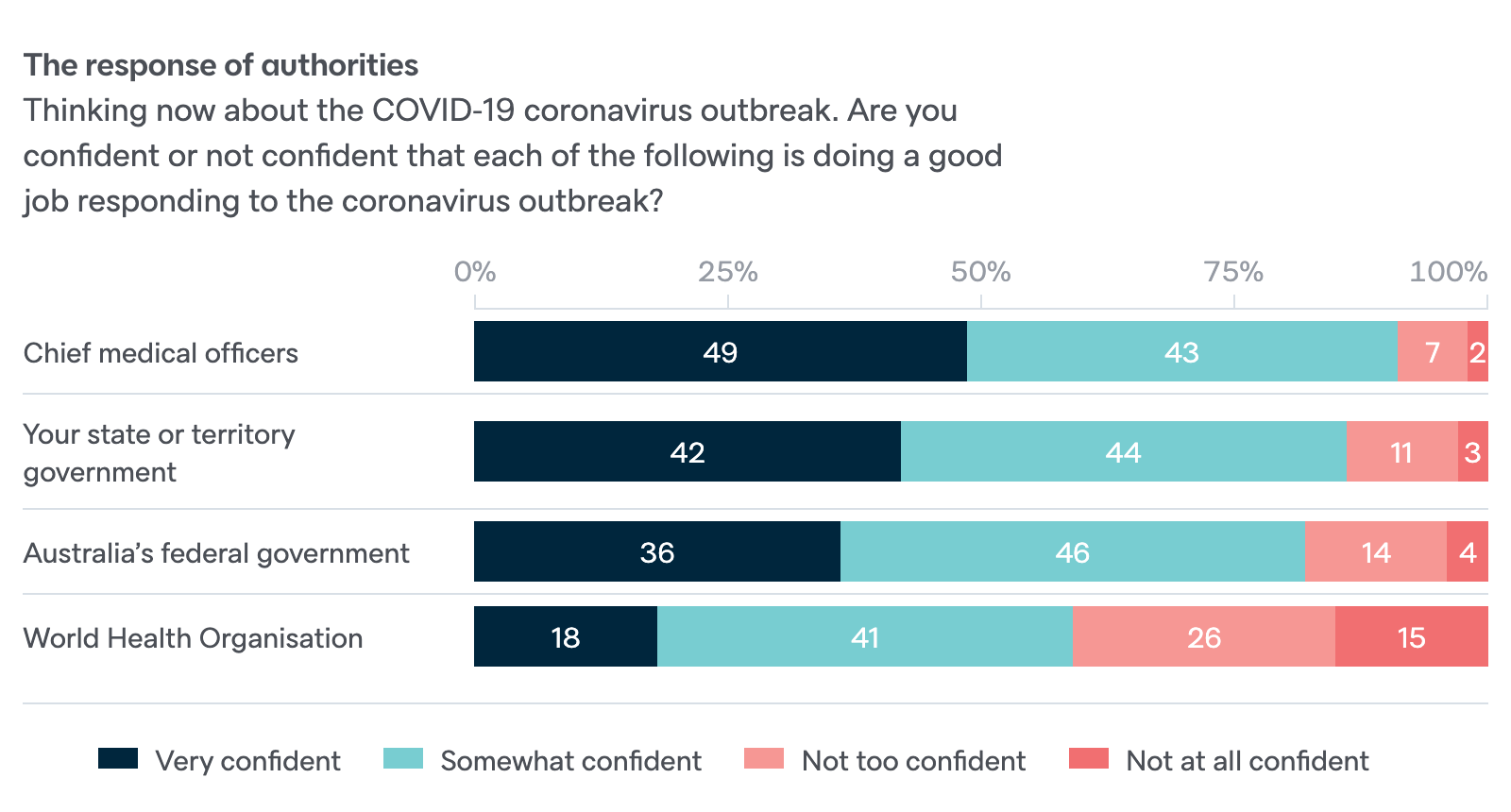
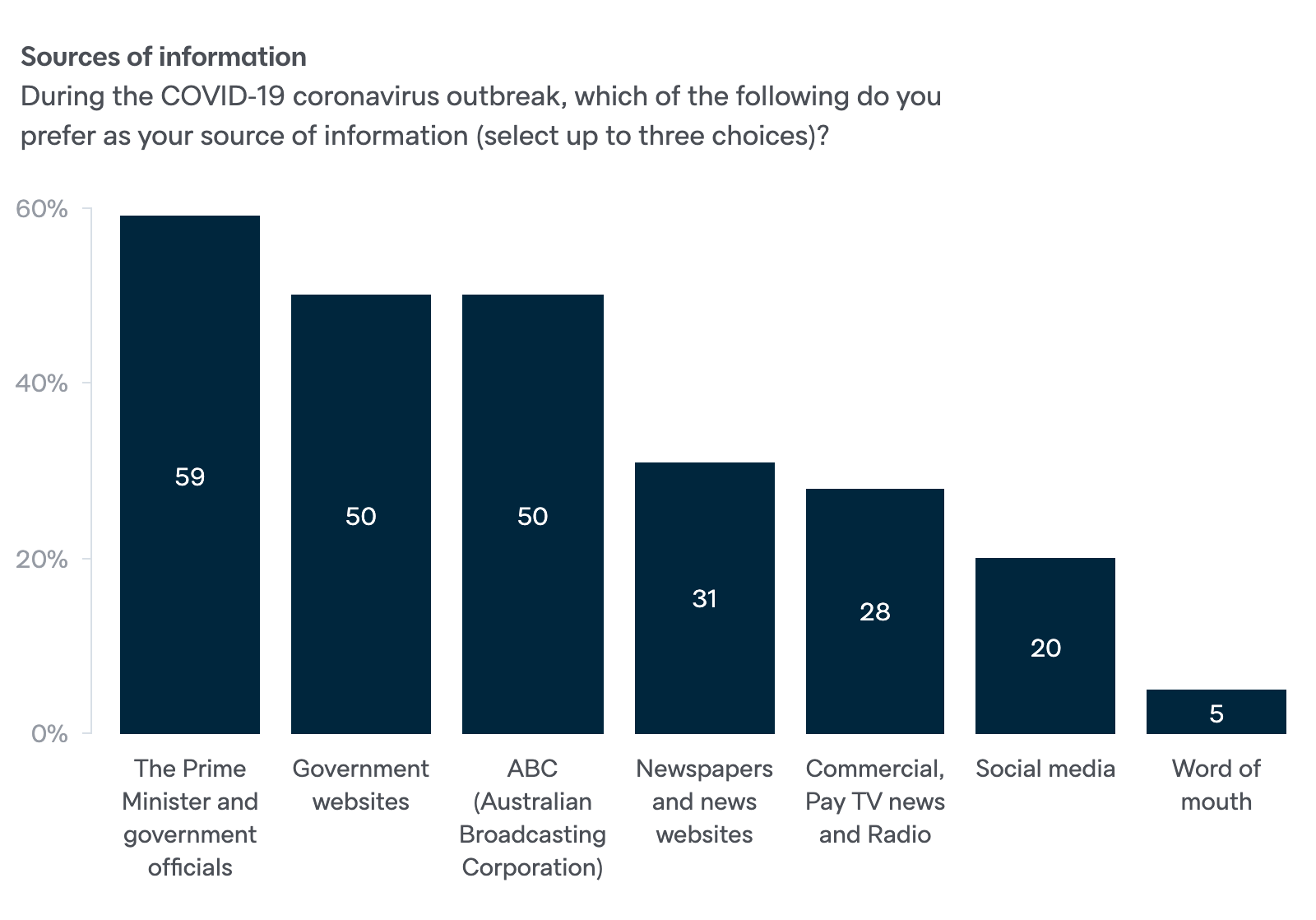
Tables of results
1. Global responses
Overall, how well or badly do you think each of the following countries have handled the COVID-19 coronavirus outbreak so far?
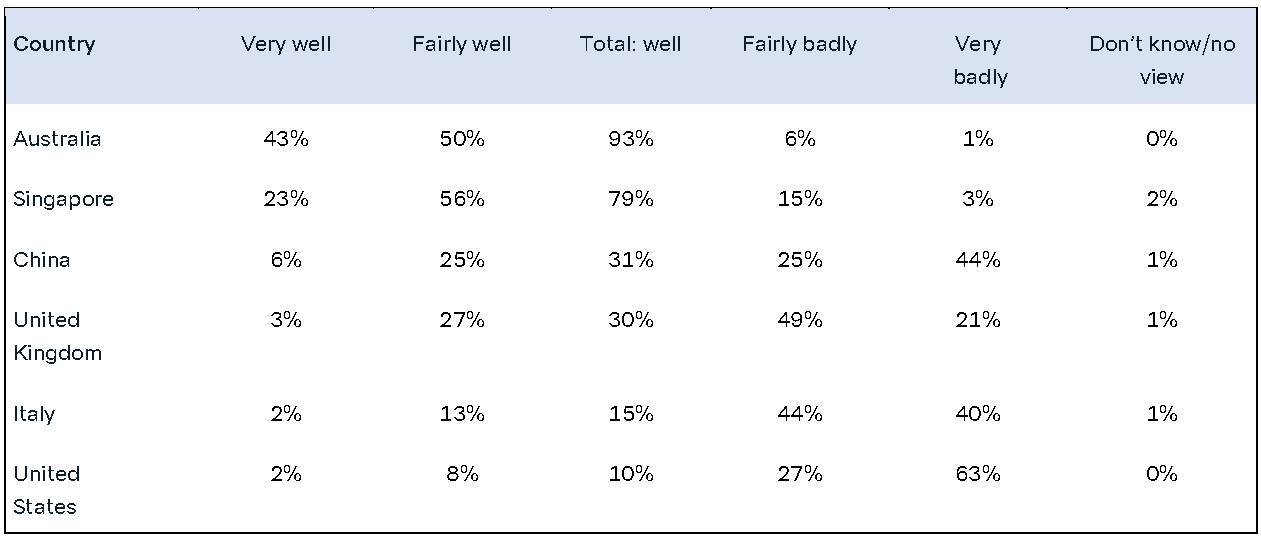
2. Power in the post-crisis period
The world is currently going through a severe health and economic crisis. When the world recovers from this crisis do you think each of the following will be more powerful, less powerful or will they just be as powerful as they were before the crisis?


3. China’s system of government
Thinking about the way China has handled the COVID-19 coronavirus outbreak, are you more or less favourable towards China’s system of government?

4. US presidential election
The United States’ presidential election will be held in November this year. Which candidate would you prefer to see become President of the United States?
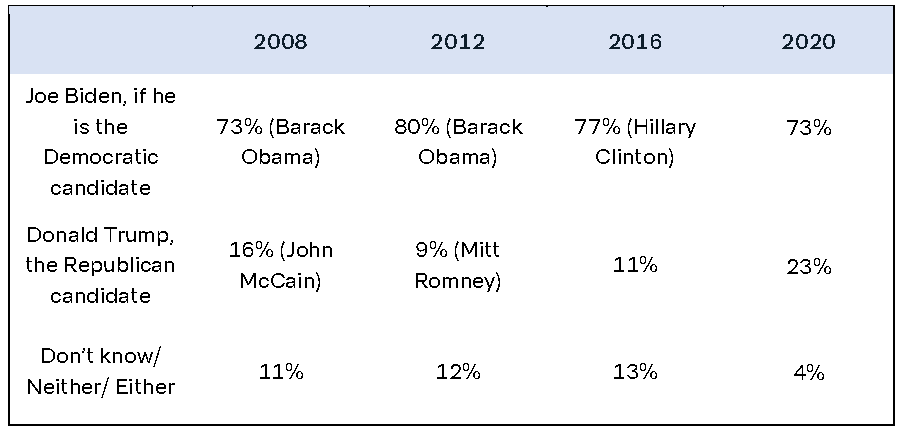
5. Globalisation
Now on globalisation. Do you believe that globalisation, especially the increasing connections of our economy with others around the world, is mostly good or mostly bad for Australia?

6. Global cooperation during crisis
How has the COVID-19 coronavirus outbreak changed your view, if at all, on global responses to international crises?
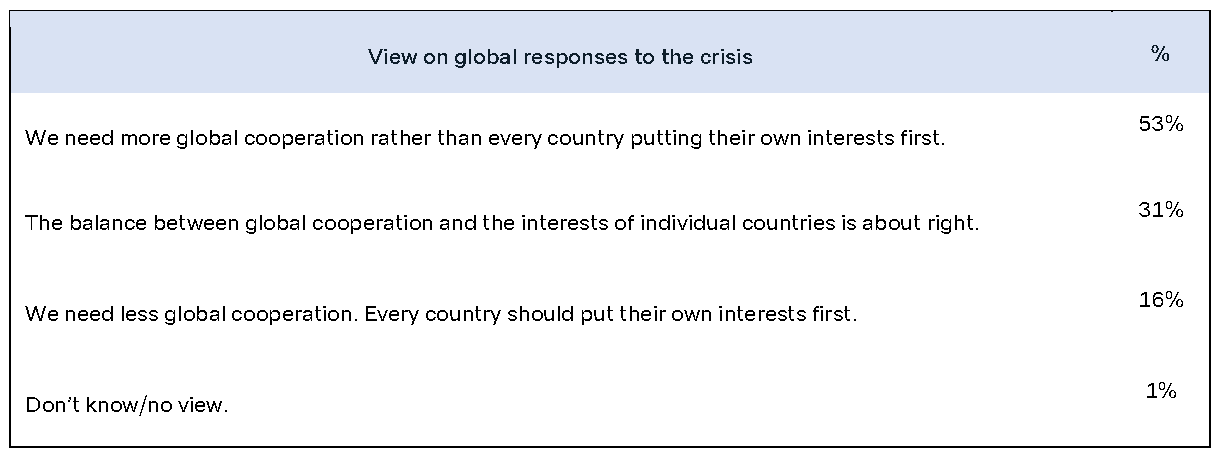
7. Willingness to travel
Thinking about when the COVID-19 coronavirus outbreak is contained in the future, are you more or less likely to travel overseas than you were prior to the outbreak?

8. The response of authorities
Thinking now about the COVID-19 coronavirus outbreak. Are you confident or not confident that each of the following is doing a good job responding to the coronavirus outbreak?
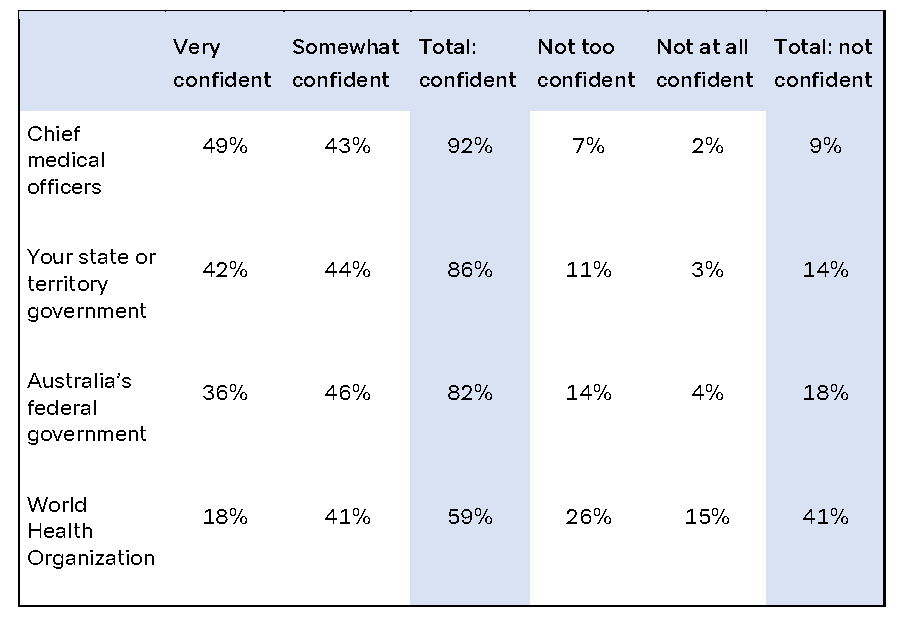
9. Sources of information
During the COVID-19 coronavirus outbreak, which of the following do you prefer as your source of information (select up to three choices)?
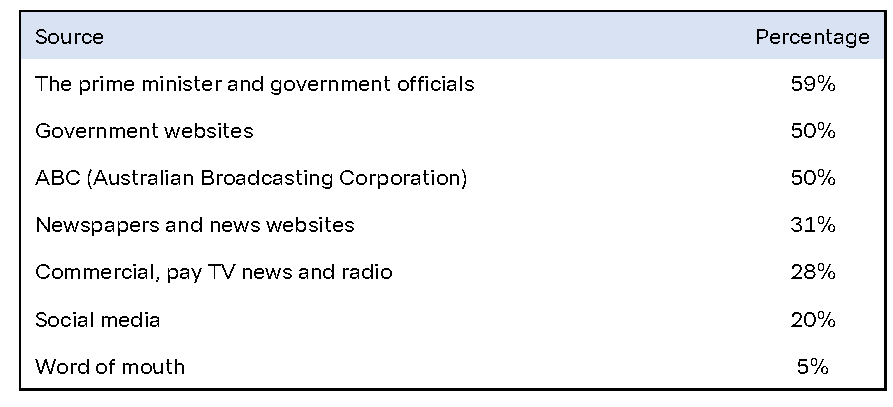
Methodology
COVIDpoll by the Lowy Institute Poll reports the results of a nationally representative online and telephone survey conducted by the Social Research Centre between 14 and 27 April 2020 with a sample size of 3036 Australian adults. The order of the questions in this questionnaire was different from the order presented in this report.
The survey was conducted by the Social Research Centre (SRC), using the Life in Australia™ panel — currently the only probability-based online panel in Australia. Members of the panel were randomly recruited via their landline or mobile (rather than being self-selected volunteers) and agreed to provide their contact details to take part in surveys on a regular basis. SRC uses a mixed-mode approach for the panel, including online surveys (94% of respondents) and computer-assisted telephone interviewing (6% of respondents) to provide coverage of the offline population (households without internet access).
On a simple random sample of 3036 responses, the margin of error is approximately 1.8%. Where a complex sample is used, the ‘design effect’ measures the additional variance in comparison with a simple random sample. The design effect for this survey is estimated at 1.86. For the COVIDpoll survey, a completion rate of 76.9% was achieved. Unlike other commercial online panels in Australia, the probability basis of the Life in Australia sampling method means results are generalisable to the national population and sampling errors and confidence intervals can be calculated.
For more information on the Lowy Institute Poll and methodology, go to https://lowyinstitutepoll.lowyinstitute.org/.
Notes
[1] Fergus Hanson, The Lowy Institute Poll 2009, Australia in the World: Public Opinion and Foreign Policy (Sydney: Lowy Institute, 2009), https://www.lowyinstitute.org/publications/2009-lowy-institute-poll.
[2] Fergus Hanson, The Lowy Institute Poll 2008, Australia in the World: Public Opinion and Foreign Policy (Sydney: Lowy Institute, 2008), https://www.lowyinstitute.org/publications/2008-lowy-institute-poll-australia-and-world.
[3] Alex Oliver, 2016 Lowy Institute Polling: The US Presidential Election, Asylum Seeker Policy and Methods for Reducing Carbon Emissions (Sydney: Lowy Institute, 2016), https://www.lowyinstitute.org/publications/2016-lowy-institute-polling-us-presidential-election-asylum-seeker-policy-and-methods.
[4] Fergus Hanson, The Lowy Institute Poll 2009, Australia in the World: Public Opinion and Foreign Policy.
[5] Ivan Cook, The Lowy Institute Poll 2006: Australia, Indonesia and the World (Sydney: Lowy Institute, 2006), https://www.lowyinstitute.org/publications/lowy-institute-poll-2006-australia-indonesia-and-world; Natasha Kassam, The Lowy Institute Poll 2019 (Sydney: Lowy Institute, 2019), https://www.lowyinstitute.org/publications/lowy-institute-poll-2019.
[6] Austrade and Tourism Research Australia, Tourism Forecasts 2019 (Canberra: Austrade, 2019) https://www.destinationnsw.com.au/wp-content/uploads/2019/09/tourism-research-australia-tourism-forecast-report-2019.pdf; Department of Foreign Affairs and Trade, Going overseas to live or work, accessed 11 May 2020, https://www.smartraveller.gov.au/before-you-go/activities/living-overseas.
Acknowledgements
Fieldwork for COVIDpoll was managed by Tina Petroulias and Matilda Page of the Social Research Centre. Dr Benjamin Phillips of the Social Research Centre provided technical support. John Davis of OmniPoll provided independent consulting and reviewed the questionnaire and report. The survey was funded entirely by the Lowy Institute.


